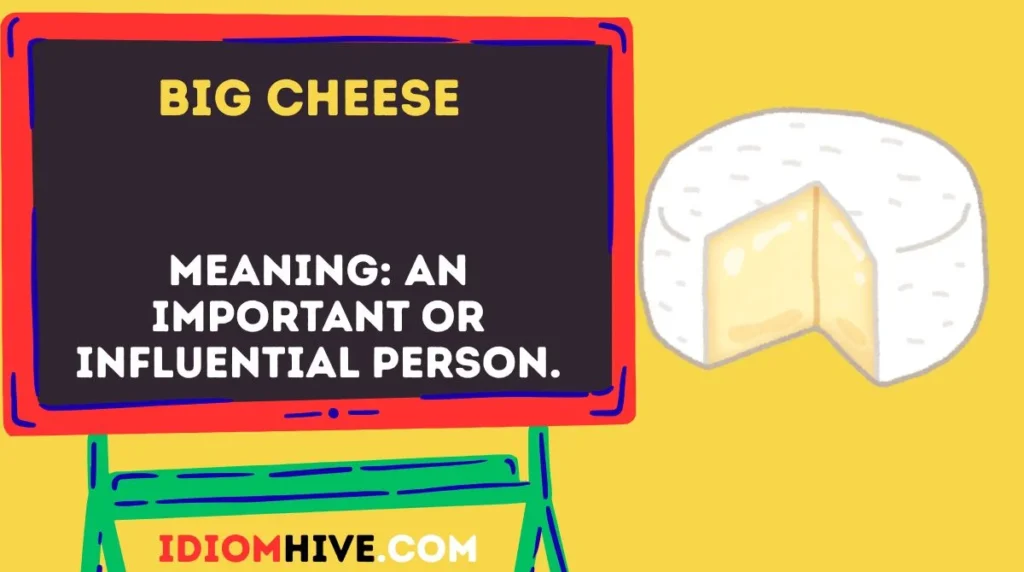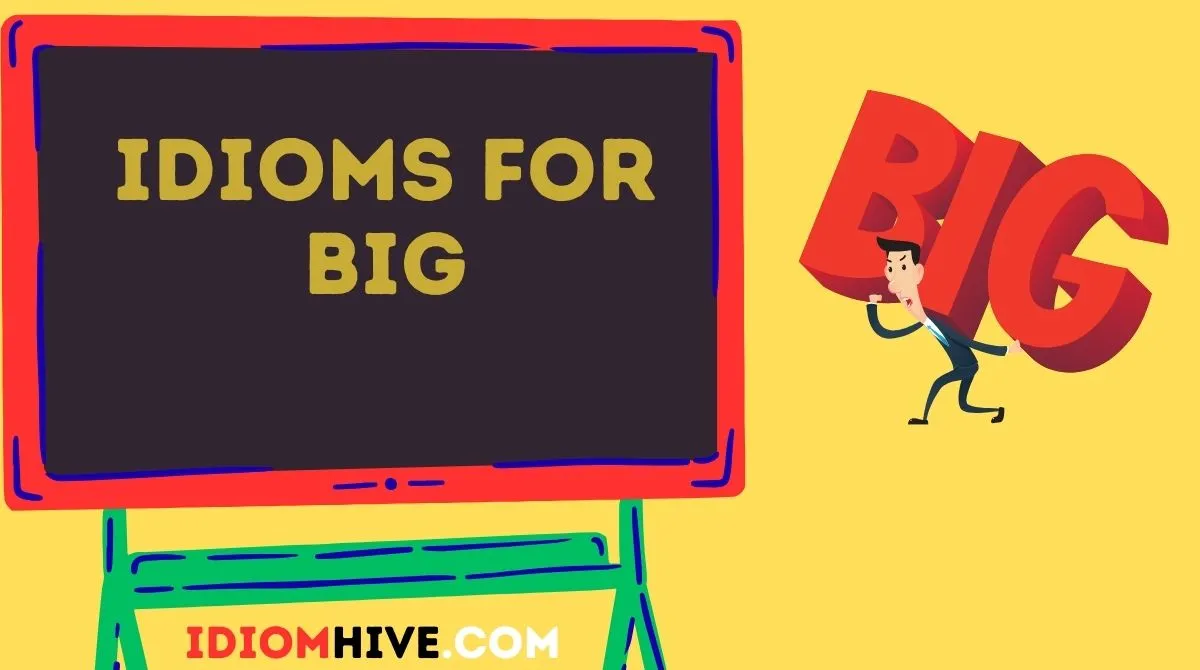Language is not just about words; it’s about expression, culture, and creativity. One of the most colorful ways English speakers express themselves is through idioms. Idioms are phrases whose meanings go beyond their literal words.
Instead of simply saying “very big,” English has dozens of creative expressions that bring life and emphasis to the idea of size. Learning idioms for “big” helps you sound more fluent, natural, and engaging in both spoken and written English.
Whether you want to describe a huge problem, an important person, or an exciting event, idioms for “big” give your words more power.
These phrases are widely used in everyday conversations, stories, and even professional communication. By mastering them, you’ll not only improve your vocabulary but also connect better with native speakers.
Did You Know?
The word “big” in English is one of the most versatile words. It doesn’t just mean “large in size”—it can also describe importance, success, fame, and even personality traits. That’s why idioms with “big” often reflect power, significance, and exaggeration.
Idioms for Big Things and Size
A Big Fish in a Small Pond
Meaning: An important person in a small group.
Example: In her local art club, she’s a big fish in a small pond.
Alternative: “Top dog”
Reflection: Often used informally to show importance in a limited space.
Big Shoes to Fill
Meaning: Taking over a role that was done very well by someone else.
Example: After the CEO retired, the new leader had big shoes to fill.
Alternative: “Hard act to follow”
Reflection: Common in workplaces or leadership contexts.
Big Cheese

Meaning: An important or influential person.
Example: He acts like he’s the big cheese around here.
Alternative: “Head honcho”
Reflection: Informal, often playful or sarcastic.
Go Big or Go Home
Meaning: Put in maximum effort or don’t bother at all.
Example: We decided to go big or go home with the wedding decorations.
Alternative: “All or nothing”
Reflection: Very common in motivational or casual settings.
A Big Deal
Meaning: Something important or significant.
Example: Winning this scholarship is a big deal for me.
Alternative: “A major thing”
Reflection: Widely used in both formal and informal English.
The Big Time
Meaning: Success, fame, or being at the top.
Example: The actor finally hit the big time after years of struggle.
Alternative: “Made it”
Reflection: Often connected with careers and fame.
Big Gun
Meaning: A person with great influence or power.
Example: They brought in the big guns to win the case.
Alternative: “Heavy hitter”
Reflection: Common in business and politics.
A Big Hit
Meaning: Something very successful.
Example: The new song was a big hit worldwide.
Alternative: “Smash success”
Reflection: Used in entertainment, events, or marketing.
Big Picture
Meaning: The overall perspective, not the small details.
Example: Let’s not get lost in details—focus on the big picture.
Alternative: “Overall view”
Reflection: Often used in professional or academic contexts.
Think Big
Meaning: Have ambitious goals.
Example: If you want to start a business, you must think big.
Alternative: “Aim high”
Reflection: Motivational and aspirational usage.
Idioms for Big People and Importance
Big Brother
Meaning: A powerful authority watching over people (often government).
Example: Some say social media feels like Big Brother is watching.
Alternative: “Watcher”
Reflection: Used in discussions about privacy and control.
Big Name
Meaning: A famous or well-known person.
Example: She became a big name in fashion.
Alternative: “Celebrity”
Reflection: Common in media and entertainment.
Big Wig
Meaning: An important person in an organization.
Example: The big wigs from headquarters are visiting tomorrow.
Alternative: “Top brass”
Reflection: Informal, workplace jargon.
Big Shot
Meaning: Someone powerful or important.
Example: He’s a big shot in the tech industry.
Alternative: “Influential figure”
Reflection: Informal, often used in admiration or sarcasm.
Big Man on Campus
Meaning: The most popular or important male in a group.
Example: In high school, he was the big man on campus.
Alternative: “Star player”
Reflection: Informal, often used in school or college context.
Big Hand
Meaning: Loud applause or recognition.
Example: Let’s give the performer a big hand.
Alternative: “Round of applause”
Reflection: Common in events and shows.
Big Brotherly Role
Meaning: Acting as a protective figure.
Example: He took on a big brotherly role for his younger teammates.
Alternative: “Guardian role”
Reflection: Informal and personal.
Idioms for Big Problems and Challenges
Big Headache
Meaning: A serious problem or difficulty.
Example: The new policy is a big headache for small businesses.
Alternative: “Major issue”
Reflection: Used in workplaces and everyday issues.
Big Ask
Meaning: A difficult request.
Example: Expecting her to finish in one day is a big ask.
Alternative: “Tall order”
Reflection: Common in work or negotiations.
Big Trouble
Meaning: Serious problems.
Example: If you’re late again, you’ll be in big trouble.
Alternative: “Deep water”
Reflection: Informal, often in warnings.
Big Lie
Meaning: A huge falsehood.
Example: The rumor was nothing more than a big lie.
Alternative: “Whopper”
Reflection: Used in political or personal contexts.
Big Risk
Meaning: A dangerous or uncertain action.
Example: Starting a business during a recession is a big risk.
Alternative: “High stakes”
Reflection: Common in business and investment.
Big Loss
Meaning: A significant failure or sadness.
Example: Losing her mentor was a big loss.
Alternative: “Major setback”
Reflection: Often used in emotional or professional contexts.
Big Storm Brewing
Meaning: Trouble or conflict coming soon.
Example: With rising tensions, a big storm is brewing.
Alternative: “Trouble ahead”
Reflection: Figurative, dramatic tone.
Too Big for One’s Boots
Meaning: Acting overly proud or arrogant.
Example: After his promotion, he got too big for his boots.
Alternative: “Full of oneself”
Reflection: Informal, critical tone.
Big Mouth

Meaning: Someone who talks too much or reveals secrets.
Example: Don’t tell him—he’s got a big mouth.
Alternative: “Blabbermouth”
Reflection: Informal, often humorous.
Idioms for Big Success and Ambition
Big Bucks
Meaning: A lot of money.
Example: He earns big bucks working in finance.
Alternative: “Loads of money”
Reflection: Informal, money-related talk.
Dream Big
Meaning: Have ambitious dreams.
Example: She always told her children to dream big.
Alternative: “Aim high”
Reflection: Inspirational, motivational.
Strike It Big
Meaning: Suddenly become successful or wealthy.
Example: They struck it big with their startup idea.
Alternative: “Hit the jackpot”
Reflection: Common in business, entrepreneurship.
Play the Big Game
Meaning: Compete at the highest level.
Example: Now that they’ve expanded, they’re ready to play the big game.
Alternative: “Step into the big league”
Reflection: Business and sports settings.
The Big Break
Meaning: An important opportunity for success.
Example: Her big break came when she got a lead role.
Alternative: “Golden chance”
Reflection: Common in careers and arts.
Big Step
Meaning: An important move or progress.
Example: Moving abroad was a big step for her.
Alternative: “Major leap”
Reflection: Often in personal growth discussions.
The Big League
Meaning: The highest or most important level.
Example: After years in small clubs, he finally joined the big league.
Alternative: “Top tier”
Reflection: Sports, careers, achievements.
Make It Big
Meaning: Become very successful or famous.
Example: Many dream of making it big in Hollywood.
Alternative: “Rise to the top”
Reflection: Motivational and aspirational.
Live Large
Meaning: Enjoy a luxurious lifestyle.
Example: After winning the lottery, they began to live large.
Alternative: “Live the high life”
Reflection: Informal, lifestyle-related.
How to Use These Idioms in Daily Life
- Speaking: Use idioms naturally in conversations to sound more fluent. For example: “He really made it big after that movie.”
- Writing: Idioms can make essays, blogs, and stories more engaging. Use them sparingly for impact.
- Professional Use: Some idioms like “big picture” or “big step” are common in workplaces and presentations.
Common Mistakes Learners Make With Idioms
- Wrong Context
❌ He is a big fish in the sea.
✅ He is a big fish in a small pond. - Overuse
❌ Every sentence packed with idioms sounds unnatural.
✅ Mix idioms with plain English for balance. - Literal Translation
❌ She has a big shoes.
✅ She has big shoes to fill.
FAQs
1. What does “big deal” really mean?
It means something important or significant. Depending on tone, it can also mean the opposite (sarcastic).
2. Can idioms for “big” be used in formal English?
Yes, some idioms like “big picture” or “big step” are widely accepted in formal communication.
3. Are idioms universal across cultures?
Not always. Idioms are culture-specific, so direct translations may not make sense in other languages.
4. How can I practice idioms?
Try using one or two idioms in daily conversations or write short sentences with them.
5. Do native speakers use idioms often?
Yes, but naturally and sparingly. They usually use idioms in casual talk, writing, or to add color to language.
Conclusion
Idioms for “big” are more than just fun phrases—they bring richness, power, and creativity to your English. From describing influential people (big shots, big cheese) to highlighting success (make it big, big break) or struggles (big headache, big risk),
these expressions make your language more dynamic. Mastering them not only improves fluency but also helps you understand native speakers better.
So next time, instead of saying “important” or “large,” try slipping in a “big” idiom—you’ll sound more confident and natural!










